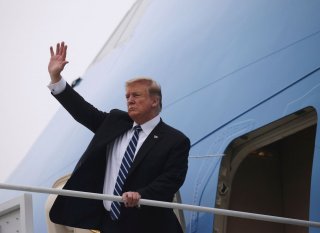Trump-Kim Summit Before the 2020 Election? Don't Bet On It.
Kim wants to keep building his deterrence and Trump is focused on the American economy.
During this year’s annual New Year’s speech, Kim Jong-un declared that if the United States continued its hostile policy toward North Korea, “there will never be the denuclearization of the Korean peninsula.” It’s a point Kim has stressed through the years—unless the U.S. concedes first, nothing will change. Since there are no indications of that happening, the remainder of this year will see little action between the two countries.
That being said, North Korea will continue testing missiles. Earlier this year, Kim mentioned that they were no longer unilaterally bound to reduce weapons production. He announced the world would witness a “new strategic weapon” in the near future. Reports suggest that this weapon could be a 3,000-ton submarine equipped with multiple SLBMs. It would provide Kim with the ability to target the U.S. from land and sea, further cementing North Korea’s status as a nuclear power.
At the same time, North Korea is unlikely to test long-range missiles like the Hwasong-15. Kim will recall that in 2017, the threat of a missile that could reach the entire U.S. mainland was met with threats of war. While Pyongyang could decide to embarrass Washington prior to the election in November, it would prove risky to provoke a president who can turn bellicose at any moment.
Kim will most likely wait and see how the presidential election unfolds before proceeding with his next move. Another failed summit/deal would not benefit Kim in any way—it may end up hurting his image instead. Failure to wrap up a deal in 2019 showed that Trump was not looking for any victory. This may have motivated Kim to appoint Ri Son Gwon, a hardline ex-army officer, as the new foreign minister.
At least in the near future, Kim is likely to continue pursuing new weapons to turn North Korea’s position as a nuclear state into a fait accompli. Sending a delegation to China to discuss trade and bolstering food imports suggests that Pyongyang is convinced that U.S.-led sanctions will not end. Since negotiation will prove difficult, it is only logical that Kim continues the controlled buildup of weapons.
As for Trump, the novelty of bringing peace to the Korean peninsula has worn off. The president only seems interested in dealing with the threat of North Korea when it benefits him. Even the historic Trump-Kim summit last year can be seen as a tactic to divert attention from the highly anticipated Mueller Report.
So hypothetically, if the coronavirus situation gets worse, could Trump court Kim into meeting him for another summit? Time constraints say no. With less than half a year until the election, the likelihood of getting the two leaders to the table is low. Supposing they did, another failed summit before an election would only hurt Trump. Therefore, the ever businessman-like Trump would not agree to such a plan.
Besides, coronavirus is the primary focus of the president. One need not look further than his tweets to know that North Korea is far from the priority. Trump’s obsession with poll numbers also indicates that his focus will be on the economy, not Kim Jong-un. A recent Gallup survey found that 45% of Americans named COVID-19 as the most important problem facing the United States. A slightly higher percentage of Republicans named the economy as the issue they cared about. Nowhere is North Korea or any other foreign country mentioned as a priority.
Considering the points above, there will be little development in U.S.-North Korea relations. Unless Trump decides otherwise, coronavirus and the election will be the top priorities. In that sense, as long as Trump remains silent on North Korea, Kim will continue on the path to self-reliance and self-sufficiency.
Rintaro Nishimura is a Korean Studies Spring 2020 Research Assistant at the Center for the National Interest.
Image: Reuters

